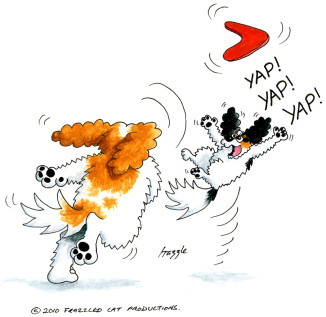By Penny Watson MA VetMD CertVR DSAM DipECVIM MRCVS
- Pancreatitis is not often diagnosed as a single test. Please seek specialist help.
-
Chronic pancreatitis is being increasingly recognized in cavalier king Charles spaniels. This brief summary is to help you understand what this means, how it affects your dog and how you can help you vet manage the disease.
What is pancreatitis?
 The pancreas is a small organ just behind the stomach which has two very important functions:
The pancreas is a small organ just behind the stomach which has two very important functions:
- Firstly, it produces enzymes which go down a duct in to the gut and are critical in the digestion of food. These enzymes are especially important for fat digestion. If they are deficient, the animal develops what is know as ‘exocrine pancreatic insufficiency’ (EPI) where they cannot digest fat properly so typically lose weight in spite of a ravenous appetite and have smelly, fatty faeces. This is treated relatively easily by feeding a low fat diet and adding enzymes to the food.
- Secondly, the pancreas produces a hormone called insulin which passes in the blood stream to all the organs in the body and is centrally important in the regulation of blood glucose levels and energy supply to the cells of the body. A deficiency of this hormone results in the development of DIABETES MELLITUS where the blood sugar level is very high and the animal drinks and urinates excessively. This is also relatively easily treated by giving the dog regular insulin injections and keeping daily food and exercise as stable as possible.
It is important to note that diabetes and EPI do NOT occur in many dogs with pancreatitis – the dog has to destroy 90% of its pancreas to develop these, which usually takes many years as described below.
 ‘Pancreatitis’ means inflammation of the pancreas. This occurs when digestive enzymes are prematurely released in to the pancreas and literally start to digest it. This can obviously be very painful and often causes a focal form of peritonitis and pain. Affected dogs typically go off their food and often vomit and show some signs of stomach pain. They can also have a little blood on their faeces and straining. Occasionally, dogs will have a severe flare up with severe bloody diarrhoea but this is not common. Some dogs have very few clinical signs at all. ‘Acute pancreatitis’ is short term and does not result in permanent scarring of the pancreas, but can be very serious. ‘Chronic pancreatitis’ means that this inflammation has been present for a long time and has produced some permanent scarring in the pancreas. Dogs with chronic pancreatitis typically have milder signs but flare-ups come and go weeks to months apart.
‘Pancreatitis’ means inflammation of the pancreas. This occurs when digestive enzymes are prematurely released in to the pancreas and literally start to digest it. This can obviously be very painful and often causes a focal form of peritonitis and pain. Affected dogs typically go off their food and often vomit and show some signs of stomach pain. They can also have a little blood on their faeces and straining. Occasionally, dogs will have a severe flare up with severe bloody diarrhoea but this is not common. Some dogs have very few clinical signs at all. ‘Acute pancreatitis’ is short term and does not result in permanent scarring of the pancreas, but can be very serious. ‘Chronic pancreatitis’ means that this inflammation has been present for a long time and has produced some permanent scarring in the pancreas. Dogs with chronic pancreatitis typically have milder signs but flare-ups come and go weeks to months apart.
Pancreatitis is relatively common in humans and dogs. In man, alcoholism and certain genetic conditions predispose to pancreatitis, but much is not understood about the disease. The causes in dogs are usually unknown. We know in both dogs and man that the signs of the illness can vary widely from no signs at all to recurring abdominal pain and even, in severe cases, life-threatening shock and peritonitis (but this is very unlikely indeed in a dog with chronic disease). We also know that a small proportion of dogs (and humans) with chronic pancreatitis will eventually destroy enough of their pancreas to develop EPI and/or diabetes. They need to lose about 90% of their pancreas to do this so many dogs live with pancreatitis for their whole lives without developing these problems.
We are working on studies to help us understand the cause in cavaliers. We believe cavaliers have an increased tendency to produce scar tissue in their pancreas. We also believe this may be linked in some way to bacteria in their gut. Many dogs also get concurrent scarring in their kidneys and we are working to understand why.
Management
 If you believe your dog may have pancreatitis, it is very important to consult your vet. At the moment, the diagnosis is difficult and relies on a combination of blood test and ultrasound findings. Even then, some dogs are ‘normal’ on all tests and yet still have chronic pancreatitis. If your vet is unsure, they may wish to consult a specialist for more investigations.
If you believe your dog may have pancreatitis, it is very important to consult your vet. At the moment, the diagnosis is difficult and relies on a combination of blood test and ultrasound findings. Even then, some dogs are ‘normal’ on all tests and yet still have chronic pancreatitis. If your vet is unsure, they may wish to consult a specialist for more investigations.
The treatment of pancreatitis involves three important areas:
- Analgesia (painkillers): pancreatitis can be a very painful disease and it is important for affected dogs to have appropriate pain killers
- Fluid therapy: it is also very important that affected dogs get enough fluids. If they are mildly affected, this can be simply by drinking. For more severely affected dogs, this will mean going in to the vets on a drip
- Feeding: it is important that affected dogs eat, although a day or two off food when they feel ill is fine. Long term, most cavaliers respond best to a low fat diet such as the veterinary low fat diets or Chappie. Fatty diets and tit bits tend to cause pain and flare-ups. If you would like to feed your dog on a home made low fat diet long term, discuss this with your vet who should be able to recommend a veterinary nutritionist to produce a balanced diet plan for you.

